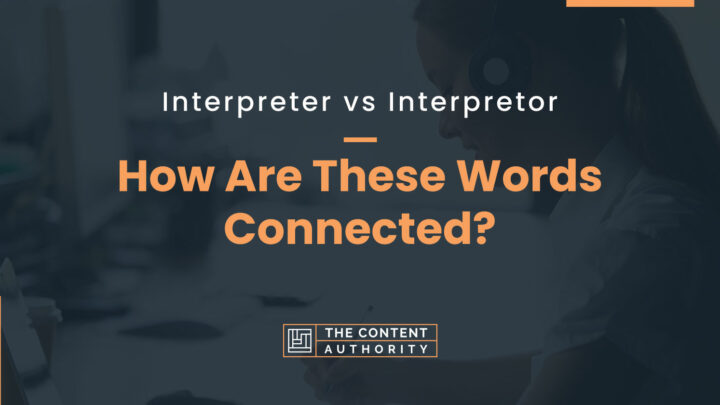Interpreter vs interpretor; what is the correct spelling of the noun formed from the verb interpret? Worry not if you do not know the correct answer to this question. We will help you understand the words interpreter and interpretor in detail.
An interpreter is a person that listens to a speaker in one language and relates the utterances to an audience in a different language. This word also means “someone that explains something, like art, because they understand it better. In contrast, interpretor is an archaic form of “interpreter.”
Interpreter and interpretor are words formed from the same verb. However, one spelling is correct, and the other is not. Read on to analyze these words and understand the correct one.

Definitions Of Interpreter And Interpretor
The word-forming root for the words “interpreter” and “interpretor” is “interpret.” Therefore, understanding the word “interpret” and its definition will help you know the definitions of “interpret.” So, let us first explain the definitions of “interpret.”
“Interpret” means “to explain or tell the meaning of something.” For example, “The students will interpret the passage at the end of the chapter.”
Another meaning for “interpret” is “to orally translate something into intelligible or familiar languages or terms.” An example in a sentence is, “The group studied how to interpret dreams, signs, mysteries, and conduct.”
“Interpret” also means “to apprehend or represent something using art or an illustrative representation.” An example sentence is, “The professor taught the students to interpret their work using graphs and illustrative diagrams.”
Now that you understand the definition of “interpret,” we can dive into the meanings of interpreter and interpretor. Here is what you need to know according to reliable sources:
Definitions Of Interpreter
In translation, an interpreter is “a person that listens to a speaker communicate in one language and relates the utterances into a language that the audience understands.” An example sentence is, “The students demanded an interpreter for the event because of the foreign speaker’s thick accent.”
The symbolic meaning of the word interpreter is “someone that explains something like an exhibit” or “a person that does heritage or content interpretation.” An example sentence is, “The interpreter explained the art exhibit so well that she received a standing ovation.”
In computing, an interpreter is “a program that executes another program prepared in a programming language besides the machine code.” For example, in a sentence, “The coders will run the programs written in PYTHON through an interpreter before compiling them.”
In computer science, an interpreter is “a program that translates and executes source language statements in a single line at a time” or “a program that analyzes and executes a program one line after another.” An example sentence is, “The coders will use the interpreter to execute the source language while running the new program.”
Another definition is “a person that explains, expounds, or interprets something, like dreams, thoughts, or oral utterances.” Here is an example in a sentence, “The street interpreter failed to explain the meaning behind my recurring dreams.”
Another source defines an interpreter as “someone that mediates between people that speak different languages.” An example sentence is, “The interpreter did not do a good job at the conference because his accent was not easy to understand.”
In arts, an interpreter is “someone that uses art to represent something.” For example, “Johannes is a sensitive interpreter, almost as good as Shakespeare.”
Definitions Of Interpretor
Interpretor is an archaic spelling for the word “interpreter.” Consequently, it does not have a definition and does not appear in dictionaries.
How To Properly Use Interpreter And Interpretor In A Sentence
The words interpreter and interpretor are easy to use once you understand their differences. Understanding confusing words’ definitions will help you correctly use them in sentences. So, the definitions sections above explain that interpreter is an incorrect spelling.
At no time should you use incorrectly-spelt words in sentences. Here are some considerations you should keep in mind when using these words in sentences:
How To Use The Word Interpreter
Using this word in a sentence is easy because it is a noun. In this form, it applies when you are referring to the following:
- A person that interprets speech orally from one language to another or into sign language
- A person that analyzes artistic or illustrative works
- A person that provides commentaries on artistic works and literature
- A language specialist
- A person that predicts future events
Note: The plural of the word “interpreter” is interpreters. In a sentence: “The interpreters need special licenses to provide services in legal or medical contexts.”
How To Use The Word Interpretor
This word is an obsolete spelling for an interpreter. Avoid it in sentences because it is incorrect. For this reason, we will not provide any guidelines for using this word.
Interpreter Vs Interpretor: More On Differences And Similarities
When forming a noun from a verb, you can add suffixes like “-or” or “er.” These suffixes denote the person that performs an action described by the noun. For instance, the verb teach will become “teacher,” and donate becomes “donor.”
However, most people get confused about which suffix they should use when forming nouns from suffixes. For example, if “alternate” becomes “alternator,” why not write “interpret” as “interpretor?” The truth is that the rules for forming words and spellings in English are hard to understand and explain, even by native English speakers. So, the best you can do is memorize the correct spellings instead of trying to understand their logic.
The major difference between these words is their spelling, specifically their suffixes. However, there are also variations in their history and etymology. The word interpreter’s first known use was in the late 14th century. It has Old French roots from the word “interpreteor” and “interpreteur.”
Before the late 14th century, the accepted spelling for this word was “interpretor,” from the Latin word “interpretator,” meaning “an explainer.” Also, the word interpretor comes from the agent noun “interpretari,” meaning “explain or expound.”

List Of Examples Of Interpreter Vs Interpretor In Sentences
A key takeaway you should not forget from this article is that interpreter is the correct spelling and interpretor is an obsolete spelling. So, when using these words in conventional contexts, you should stick to the correct spelling.
This article would be incomplete without a section with examples, and we prepared the following sentences for you:
Example sentences of the word interpreter
- The interpreter sat next to the speaker on the podium.
- The dream interpreter received a lot of backlash for his interpretation of the king’s dreams.
- Jones got his certificate as an interpreter from the university after completing a linguistics and language interpretation course.
- The interpreter rode up to the group and warned them against walking into the caves.
- The interpreter traveled with the tourists and explained the entire trip to them.
Example sentences of the word interpretor
- John was a seer and an interpretor. (INCORRECT)
- The students did not understand the language, so the professor hired an interpretor. (INCORRECT)
- Felicia acted as the unofficial interpretor for his father during their trip to Germany. (INCORRECT)
- The British interpretor refused to translate for the German lecturer because of internal conflicts. (INCORRECT)
- I played the interpretor role in my friend group because I am the only one that speaks French. (INCORRECT)
More Great Word Vs Word Posts
Conclusion
Interpreter and interpretor are just two out of thousands, if not millions, of confusing English words. Luckily, our focus is to gather groups of confusing words and clarify them. So, if you find this article helpful, feel free to read our other posts, and you will be happy to relieve some doubts about words’ usage.
Shawn Manaher is the founder and CEO of The Content Authority. He’s one part content manager, one part writing ninja organizer, and two parts leader of top content creators. You don’t even want to know what he calls pancakes.

